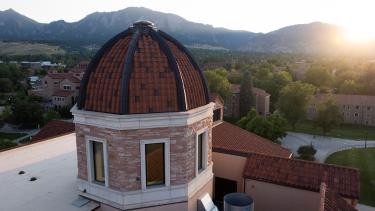CESR Student Assistant Represents in Costa Rica

If you have ever travelled somewhere outside the country, you are likely familiar with stepping outside your comfort zone. When I stepped off the plane and into Costa Rica last month, I found myself further outside this zone than ever before. This is because in addition to traveling abroad, I was taking my first ever business trip and attending the UN Principles of Responsible Management Education (PRME) Champions Meeting. At this meeting, I was among faculty and staff representing 32 institutions from 20 different countries. These institutions all had one thing in common: their commitment to focusing on education that emphasizes sustainability, ethics, and corporate social responsibility.
PRME Champions
To become a PRME Champion, each of these institutions have proven that they excel in their strategy and implementation of these topics within business and economics. The Leeds School of Business at the University of Colorado Boulder is a PRME Champion School. Mark Meaney, the Center for Ethics and Social Responsibility (CESR)’s Executive Director, has a strong commitment to spreading knowledge of the Sustainable Development Goals (SDGs) and techniques of responsible management education with students.
“It has been the highlight of my career to serve as the UN PRME North America Chairperson, on PRME’s International Advisory Board, and as the Leeds PRME Manager,” says Mark Meaney. His appointments “reflect the commitment that the Leeds School and Dean Sharon Matusik have to the principles of responsible management education and to the UN Sustainable Development Goals.”
Sent by CESR to represent the University of Colorado Boulder at this conference, I had the unique experience of being the very first student to attend a PRME Champions meeting. Although I was initially intimidated by the prestigious academics that were attending, they welcomed me from the beginning and were incredibly open to hearing my opinions and insight.
Highlights from the Week
Throughout the week we discussed experiential learning programs that allow students to step outside the classroom and gain an on-the-ground perspective. To better understand the value of these experiences, we visited a few including Costa Rica’s largest slum, La Carpio. There, we heard from local entrepreneurs about the challenges of working in informal markets.
Additionally, we traveled to Nosara Beach, a small town on the west coast of Costa Rica. Despite its international reputation as a tourist destination and almost 70% of residents working in tourism, it has not received a high influx of visitors. The luscious landscapes seemed irresistible, but simultaneously inaccessible due to the poor condition of the roads. We were impressed by our busses being able to dodge the potholes and make the tight corners, but we realized how critical basic infrastructure is to the success of Nosara’s economic growth.
We learned about this common challenge in Costa Rica and around the world - informal markets. But by visiting La Carpio and various small enterprises in Nosara, we realized the advantages that it present as well. Although these communities do not receive basic infrastructure or assistance from the government, they also do not report taxes, which helps them from a business standpoint. Listening to the advantages and challenges of working in such informal markets opened my eyes to the realities that so many around the world live in, specifically the barriers to entry that exist.
How this is Relevant to Students
Throughout the meeting, we discussed ways that PRME Champion schools can disseminate their best practices to other universities. A large component of PRME’s purpose is to encourage the implementation of curriculum relating to sustainable and responsible business management. I began to see how much of a challenge this task is, especially since there is still much educating to do on the possibilities that are out there for sustainable businesses. But with so many schools taking strides in this area, there is potential for the distribution of knowledge and best teaching practices to other universities who aren’t yet focusing on sustainability.
By the end of the week, I was enthralled by the possibilities of education in sustainability, business ethics, and social responsibility. I felted affirmed in being so lucky to be attending Leeds and to be so involved with CESR, who are leaders in this field. But I also learned how robust the programs for this unique type of education are around the world. Talking to the representatives from the other PRME institutions made me wish I could attend every single one.
If you want to get involved with sustainability, ethics, and social responsibility, sign up to receive the CESR Newsletter or reach out to us at CESR@Colorado.edu!







